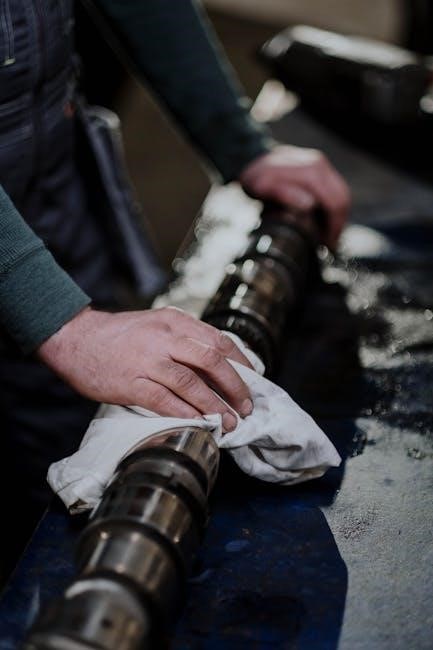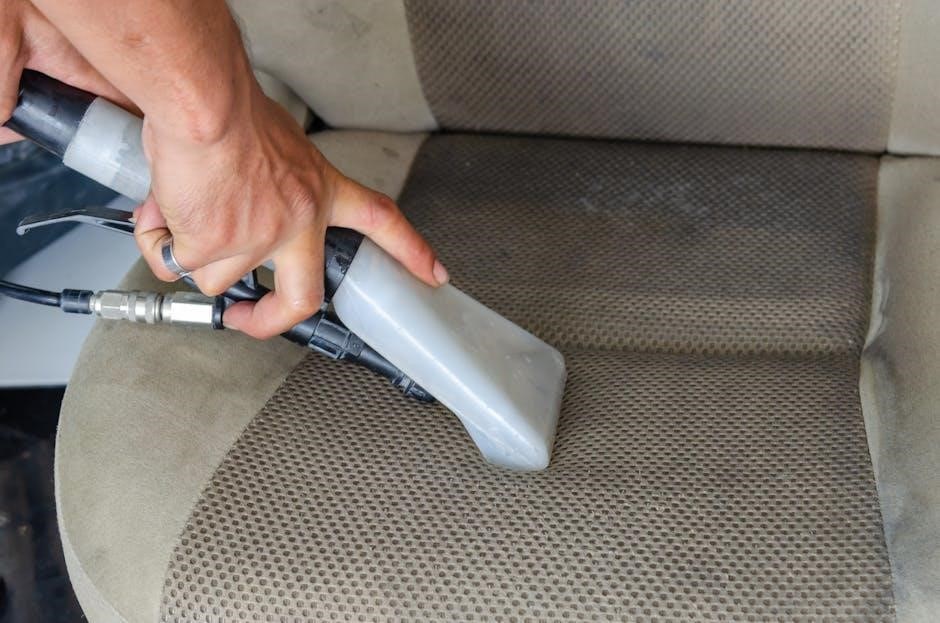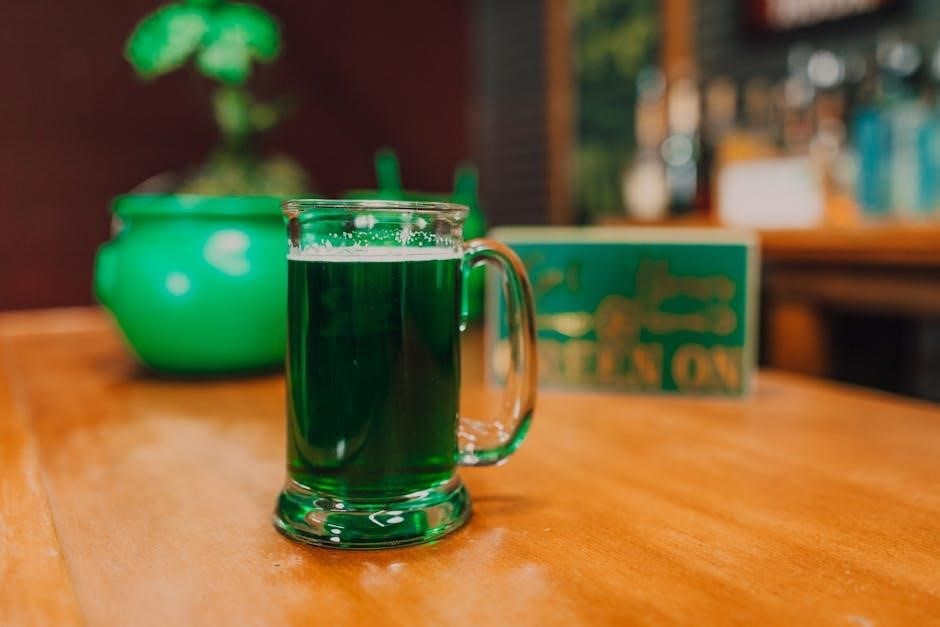Puberty is a natural journey of physical‚ hormonal‚ and emotional growth‚ marking the transition from childhood to adolescence. This guide offers a supportive and informative path for girls to understand their changing bodies‚ emotions‚ and relationships‚ fostering confidence and self-assurance during this transformative phase.
1.1 What is Puberty?
Puberty is a natural biological process marking the transition from childhood to adulthood. It involves physical‚ hormonal‚ and emotional changes that prepare the body for reproduction. In girls‚ puberty typically begins between ages 8 and 13‚ triggered by the release of hormones like estrogen. This phase includes breast development‚ growth spurts‚ and the onset of menstruation. While the timing varies‚ puberty is a normal and essential part of growth‚ shaping both physical appearance and emotional maturity.
1.2 Understanding the Physical‚ Hormonal‚ and Emotional Changes
Puberty is a complex process involving physical‚ hormonal‚ and emotional changes. Physically‚ girls experience growth spurts‚ breast development‚ and the onset of menstruation. Hormonal shifts‚ particularly the rise of estrogen‚ drive these changes. Emotionally‚ girls may face mood swings‚ heightened sensitivity‚ and challenges in self-esteem. These transformations are natural and vary in timing for each individual. Understanding these changes helps girls navigate this phase with confidence and prepares them for the responsibilities of adolescence.
Physical Changes in Girls During Puberty
Girls experience significant physical changes‚ including breast development‚ growth spurts‚ and the appearance of pubic and underarm hair. Body shape and fat distribution also evolve during this phase.
2.1 Breast Development
Breast development is often the first sign of puberty in girls‚ beginning with small breast buds. Hormonal changes trigger growth‚ and breasts gradually develop over several years. It’s normal for one breast to grow faster than the other initially. This process can start as early as age 6 or 7. Girls should wear supportive bras as needed and understand this natural progression is unique to each individual‚ ensuring comfort and confidence during this change.
2.2 Growth Spurt and Body Proportions
During puberty‚ girls experience a significant growth spurt‚ with the body rapidly increasing in height and weight. This growth often begins with the hands and feet‚ followed by the arms‚ legs‚ and torso. Hormonal changes drive this process‚ which can make girls feel taller or gangly before proportions balance out. The growth spurt typically occurs before breast development is complete‚ and it’s normal for this process to vary in timing and pace among individuals. This phase is a natural part of development‚ preparing the body for adulthood.
2.3 Pubic and Underarm Hair Growth
Puberty triggers the growth of pubic and underarm hair‚ which starts as light‚ fine strands and gradually becomes thicker and darker. This change is driven by hormonal shifts‚ particularly the increase in androgens. Girls may notice hair appearing in the pubic area first‚ followed by underarm hair. This process is a natural sign of maturation and varies in timing and texture among individuals. Proper hygiene‚ such as using gentle cleansers‚ is important to maintain cleanliness and confidence during this phase of development.
2.4 Changes in Body Shape and Fat Distribution
During puberty‚ girls experience significant changes in body shape and fat distribution. Hormonal shifts‚ particularly estrogen‚ lead to increased fat storage in the hips‚ thighs‚ and buttocks‚ creating a more curved silhouette. This natural process helps prepare the body for future reproductive roles. Some girls may notice weight gain or a redistribution of fat‚ which is normal. Understanding and embracing these changes can help build a positive body image‚ while maintaining a healthy lifestyle supports overall well-being during this transformative phase.
Emotional and Psychological Changes
Puberty brings emotional and psychological changes‚ including mood swings‚ sensitivity‚ and self-esteem challenges. Open communication and support help girls navigate these transitions confidently and healthily.
3.1 Mood Swings and Emotional Sensitivity
Mood swings and emotional sensitivity are common during puberty due to hormonal changes. Girls may feel overwhelmed‚ sensitive‚ or reactive to minor issues. Open communication and support from family and friends can help them navigate these emotional challenges. Understanding that these feelings are temporary and normal can provide comfort. Encouraging healthy coping mechanisms‚ like talking about emotions or engaging in physical activity‚ can help manage these changes effectively.
3.2 Self-Esteem and Body Image
During puberty‚ girls often experience challenges with self-esteem and body image due to rapid physical changes. Societal beauty standards and comparisons can intensify these feelings. It’s important to foster a positive body image by embracing individuality and celebrating unique qualities. Encouraging open conversations about body changes and promoting self-acceptance can help build confidence. Surrounding oneself with supportive friends and family‚ and focusing on personal strengths‚ can also enhance self-esteem during this transformative period.
3.3 Social Challenges and Peer Pressure
Puberty often brings social challenges‚ as girls navigate shifting friendships‚ peer pressure‚ and societal expectations. Body changes and hormonal shifts can make girls feel self-conscious‚ while peers may influence decisions about appearance or behavior. It’s crucial to encourage positive relationships and open communication‚ helping girls resist negative pressures. Building resilience and self-confidence can empower them to make choices that align with their values‚ fostering a strong sense of identity during this vulnerable time.
Hygiene and Self-Care During Puberty
Regular showers‚ deodorant use‚ and skincare routines are essential for maintaining hygiene. Managing body and pubic hair‚ along with acne prevention‚ helps girls feel confident and healthy.
4.1 Importance of Regular Showers and Deodorant Use
Regular showers help maintain personal hygiene and reduce body odor‚ which can increase during puberty due to hormonal changes. Using deodorant or antiperspirant helps control sweat and odor‚ boosting confidence. Consistent hygiene practices promote a fresh‚ clean feeling and support overall health. Encourage girls to shower daily and apply deodorant to manage sweat and odor effectively‚ fostering a positive self-image and healthy habits.
4.2 Skincare Routine for Acne Prevention
A consistent skincare routine is essential for managing acne during puberty. Start with a gentle cleanser to remove dirt and oil‚ followed by a toner to balance skin pH. Use a non-comedogenic moisturizer to hydrate without clogging pores. Exfoliate weekly to remove dead skin cells‚ and consider spot treatments for breakouts. Avoid heavy makeup and always remove it before bed. Sunscreen is crucial for daily protection; Consistency and patience are key to maintaining clear‚ healthy skin and preventing acne.
4.3 Hair Care Tips for Pubic and Body Hair
During puberty‚ pubic and body hair grows thicker and darker. To maintain hygiene and comfort‚ keep the area clean by washing regularly with mild soap. Trimming or shaving can help manage growth‚ but be cautious to avoid irritation. Use gentle razors and shaving creams if choosing to shave. Moisturize after shaving to soothe the skin. Avoid tight clothing that can cause friction and ingrown hairs. Practice good hygiene by washing after sweating. Embrace your body’s natural changes and take care of your hair with confidence and care.
Nutrition and Healthy Eating
A balanced diet rich in fruits‚ vegetables‚ lean proteins‚ and whole grains supports growth and hormonal balance during puberty. Include calcium for bone health and iron for energy. Healthy snacks like nuts and fruits help maintain energy levels‚ while limiting sugary and processed foods promotes overall well-being and optimal development.
5.1 Balanced Diet for Optimal Growth
A balanced diet is crucial during puberty to support rapid growth and development. Include nutrient-rich foods like lean proteins‚ whole grains‚ fruits‚ and vegetables to provide essential vitamins and minerals. Calcium from dairy products or leafy greens strengthens bones‚ while iron from red meat or spinach combats fatigue. Healthy fats‚ such as those in nuts and avocados‚ aid hormone production. Limit sugary and processed foods to maintain energy levels and overall health. A well-rounded diet helps girls thrive physically and emotionally during this transformative phase.
5.2 Foods to Support Hormonal Balance
A balanced diet plays a key role in maintaining hormonal equilibrium during puberty. Incorporate foods rich in omega-3 fatty acids‚ such as salmon and flaxseeds‚ to support brain health and hormone regulation. Leafy greens like spinach and kale provide essential vitamins and minerals‚ while berries and citrus fruits offer antioxidants to combat oxidative stress. Whole grains and legumes stabilize blood sugar‚ preventing hormonal fluctuations. Including these nutrient-dense foods in meals helps promote a healthy endocrine system and overall well-being during this critical phase of development.
5.3 Healthy Snacking Habits
Healthy snacking is essential for energy and growth during puberty. Opt for nutrient-rich options like fruits‚ nuts‚ and yogurt to satisfy hunger between meals. Avoid sugary or processed snacks‚ which can cause energy crashes and mood swings. Incorporate veggies with hummus or guacamole for a balanced choice. Staying hydrated with water or herbal teas is also crucial. Encourage mindful eating by choosing snacks that fuel your body and support overall well-being‚ helping you feel your best during this transformative time.
Understanding Menstruation
Menstruation is a natural monthly process where the uterus sheds its lining‚ preparing for a potential pregnancy. Understanding your cycle is key to managing periods effectively and maintaining hygiene. Learning about menstrual health helps girls feel confident and prepared‚ ensuring a smooth transition through puberty.
6.1 What is a Menstrual Cycle?
A menstrual cycle is the monthly process by which the uterus prepares for a potential pregnancy. It begins with menstruation‚ followed by ovulation‚ and ends with the uterus shedding its lining if pregnancy doesn’t occur. The average cycle lasts about 28 days‚ though it can vary. Understanding the menstrual cycle helps girls track their periods‚ manage hygiene‚ and recognize normal patterns. This knowledge is essential for maintaining health and confidence during puberty.
6.2 Preparing for the First Period
Preparing for the first period involves understanding the menstrual cycle‚ tracking changes‚ and maintaining hygiene. Girls should learn about pads‚ tampons‚ and other products to manage their flow. Keeping a period tracker can help anticipate when the first period may arrive. Open conversations with trusted adults‚ like parents or guardians‚ can provide emotional support and practical advice. Having a small supply of sanitary products on hand ensures readiness. Remember‚ the first period is a natural milestone‚ and being informed and prepared helps reduce anxiety and builds confidence.
6.3 Managing Menstrual Flow and Hygiene
Managing menstrual flow and hygiene is essential for comfort and health. Girls should use sanitary pads or tampons‚ changing them every 4-8 hours to prevent leaks and infections. Washing hands before handling products and wiping from front to back helps maintain cleanliness. Showering daily and using gentle soap can keep the genital area clean. Disposing of used products properly and carrying extras in a bag ensures preparedness. Tracking periods with a calendar or app can help anticipate needs and stay confident throughout the cycle.
Social and Relationship Challenges
Puberty brings social challenges‚ including peer pressure‚ self-esteem issues‚ and navigating friendships. Girls may experience crushes and romantic feelings‚ requiring open communication and support to build healthy relationships.
7.1 Navigating Friendships and Peer Relationships
During puberty‚ friendships and peer relationships evolve‚ often influenced by shared interests and emotional changes. Girls may face challenges like peer pressure‚ social comparisons‚ and conflicts. Building strong‚ supportive friendships requires empathy‚ trust‚ and open communication. It’s important to surround yourself with positive influences and maintain individuality while fostering meaningful connections. Navigating these relationships helps develop social skills and emotional resilience‚ preparing girls for lifelong friendships and a stronger sense of self.
7.2 Understanding Crushes and Romantic Feelings
Crushes and romantic feelings often emerge during puberty‚ driven by hormonal changes and emotional growth. These feelings are normal and can be exciting but may also feel overwhelming. It’s important to understand that these emotions are part of developing into a young adult. Managing crushes involves respecting boundaries‚ communicating openly‚ and prioritizing self-respect. Remember‚ it’s okay to take time to process these feelings and seek guidance from trusted adults or friends. Healthy relationships are built on mutual respect and clear communication.
7.3 Communicating with Parents and Caregivers
Open and honest communication with parents or caregivers is crucial during puberty. They can provide guidance‚ reassurance‚ and support as you navigate physical and emotional changes. Don’t hesitate to ask questions or share feelings about your body or relationships. Parents may use resources like guides or videos to help discuss sensitive topics. While friends or online content can offer advice‚ parents often provide the most personalized and trusted support. Building trust and mutual respect fosters a stronger bond and helps you feel more confident and understood.
Health and Wellness
Health and wellness during puberty involve regular exercise‚ balanced nutrition‚ adequate sleep‚ and mental health care. These practices support physical and emotional well-being‚ ensuring a healthy transition.
8.1 Exercise and Physical Activity
Regular exercise during puberty supports physical and emotional health. Activities like sports‚ dancing‚ or walking can improve mood‚ reduce stress‚ and enhance sleep quality. Exercise helps maintain a healthy weight‚ strengthens bones‚ and boosts self-esteem. Encourage girls to find enjoyable physical activities to stay active and develop lifelong healthy habits. Setting achievable goals and staying consistent can make exercise a positive part of their daily routine‚ fostering overall well-being during this transformative phase.
8.2 Importance of Sleep During Puberty
Sleep plays a crucial role in puberty‚ supporting growth‚ hormone regulation‚ and emotional well-being. During puberty‚ girls need 8-10 hours of quality sleep nightly to aid physical recovery and brain function. Lack of sleep can lead to mood swings‚ fatigue‚ and difficulty concentrating. Establishing a consistent bedtime routine‚ avoiding screens before bed‚ and creating a relaxing sleep environment can improve sleep quality. Prioritizing sleep helps girls navigate puberty with energy‚ confidence‚ and emotional resilience‚ ensuring they feel their best every day.
8.3 Mental Health and Stress Management
Puberty can bring emotional challenges‚ making mental health and stress management essential. Girls may experience mood swings‚ anxiety‚ or self-doubt due to hormonal changes. Encourage open conversations about feelings and teach healthy coping strategies‚ such as deep breathing‚ journaling‚ or talking to trusted adults. Building resilience and a positive mindset helps girls navigate stress confidently. Prioritizing mental well-being ensures they develop emotional strength and a healthy self-image during this transformative phase.
Emotional Support and Guidance
Emotional support is crucial during puberty. Open conversations with parents‚ fostering confidence‚ and addressing teasing help girls navigate this phase with resilience and self-assurance.
9.1 Talking to Parents or Guardians About Changes
Talking to parents or guardians about puberty changes is essential for guidance and support. Encourage open conversations early‚ using resources like books or guides to ease discussions. Choose a comfortable setting and be honest about feelings or concerns. Parents can offer valuable advice and reassurance‚ helping girls navigate physical and emotional shifts. This mutual dialogue fosters trust and understanding‚ ensuring girls feel supported throughout their unique journey.
9.2 Building Confidence and Self-Assurance
Building confidence during puberty involves embracing change and fostering self-acceptance. Encourage positive affirmations and self-care routines to promote a healthy self-image. Understanding bodily and emotional shifts can empower girls to feel in control. Surrounding themselves with supportive friends and family further strengthens their confidence. Remind them that everyone’s journey is unique‚ and it’s okay to take time to grow. Confidence blooms from within‚ nurtured by self-acceptance and the belief in their own potential.
9.3 Dealing with Teasing or Bullying
Dealing with teasing or bullying during puberty can be challenging‚ but there are strategies to cope. Encourage girls to ignore hurtful comments‚ stay calm‚ and avoid reacting emotionally. Teach them to seek support from trusted adults‚ friends‚ or counselors. Remind them that teasing often reflects the insecurities of others‚ not their worth. Building a strong support network and practicing self-care can help them navigate these situations with resilience. Surrounding themselves with positive influences and focusing on their strengths can also boost their ability to handle bullying confidently.
Staying Positive and Empowered
Embrace the journey of puberty with confidence and resilience. Focus on self-acceptance‚ celebrate individuality‚ and build a positive mindset to navigate changes with empowerment and grace.
10.1 Engaging in Hobbies and Interests
Engaging in hobbies and interests is a powerful way to stay positive during puberty. Activities like sports‚ art‚ music‚ or reading can distract from discomfort and build confidence. Exploring new passions fosters creativity and a sense of accomplishment. Whether it’s joining a club‚ learning an instrument‚ or simply spending time outdoors‚ these pursuits provide a healthy outlet for emotions and energy. They also offer opportunities to connect with like-minded peers‚ creating a sense of belonging and support during this transformative time.
10.2 Developing a Positive Body Image
Developing a positive body image is crucial during puberty. It involves embracing your unique changes and understanding that every body grows differently. Focus on self-acceptance and reject unrealistic societal standards. Surround yourself with positive influences and practice self-care. Celebrate your strengths and accomplishments‚ rather than criticizing your appearance. Remember‚ your worth is not defined by how you look. Foster a mindset that values health and confidence over perfection‚ helping you navigate puberty with self-assurance and resilience.
10.3 Cultivating a Growth Mindset
Cultivating a growth mindset during puberty helps girls embrace challenges as opportunities for growth. Encourage viewing changes as natural steps toward maturity‚ fostering resilience and confidence. Teach the value of effort and perseverance‚ emphasizing that abilities and intelligence can develop over time. Celebrate progress‚ no matter how small‚ and remind her that setbacks are part of learning. This mindset empowers her to navigate puberty with optimism‚ adapt to changes‚ and build a strong foundation for lifelong personal development and self-belief.
Advanced Topics in Puberty
Exploring advanced topics like precocious puberty‚ delayed development‚ and medical conditions helps girls and caregivers understand rare challenges and seek timely professional guidance for optimal health outcomes.
11.1 Understanding Precocious Puberty
Precocious puberty occurs when physical signs of puberty develop before age 8 in girls‚ often due to genetic factors or medical conditions. Early breast development‚ rapid growth‚ and pubic hair growth are common signs. This condition can affect emotional well-being and self-esteem‚ as girls may face social challenges. Consulting a pediatric endocrinologist is crucial for proper diagnosis and treatment‚ which may include hormone therapy to manage symptoms. Understanding and addressing precocious puberty early helps girls navigate this condition with confidence and support.
11.2 Delayed Puberty and When to Seek Help
Delayed puberty in girls occurs when physical signs don’t appear by age 13 or menstruation hasn’t started by 14-16. Causes include genetics‚ medical conditions‚ or hormonal imbalances. If a girl shows no breast development by 13 or no period by 14-16‚ consulting a pediatric endocrinologist is advised. They can diagnose issues like Turner syndrome or hormonal deficiencies‚ offering treatments to support growth and development. Early intervention ensures proper physical and emotional well-being.
11.3 Medical Conditions Related to Puberty
Certain medical conditions can affect puberty in girls‚ such as Turner syndrome‚ polycystic ovary syndrome (PCOS)‚ or thyroid disorders. These conditions may cause delayed or irregular puberty‚ hormonal imbalances‚ or other developmental issues. Early diagnosis by a pediatric endocrinologist is crucial for proper treatment. Interventions may include hormone therapy or lifestyle changes to manage symptoms and support healthy growth. Understanding these conditions helps girls and their families navigate puberty with informed care and confidence.
Puberty is a transformative journey‚ filled with growth and self-discovery. Embrace the changes with confidence‚ knowing you’re supported by resources and loved ones to navigate this empowering phase.
12.1 Embracing the Journey of Puberty
Embracing puberty means celebrating growth‚ self-discovery‚ and the unique journey each girl undertakes. It’s a time to foster confidence‚ resilience‚ and a positive outlook. With support from loved ones‚ educational resources‚ and open conversations‚ girls can navigate this phase with ease and empowerment. Remember‚ every experience is personal and valid‚ and this transformative period is a stepping stone toward becoming a strong‚ capable individual. Stay informed‚ stay positive‚ and embrace the journey with confidence and curiosity.
12.2 Final Tips for Navigating Puberty with Confidence
As you complete this journey‚ remember to stay informed‚ embrace open conversations‚ and surround yourself with supportive people. Practice self-care‚ including skincare‚ hygiene‚ and healthy eating‚ to feel your best. Build confidence by celebrating your unique qualities and achievements. Cultivate a positive mindset‚ knowing that challenges are temporary and growth is lifelong. Trust in your abilities‚ seek guidance when needed‚ and embrace the exciting opportunities ahead. Puberty is just the beginning of your empowered journey toward adulthood.
















